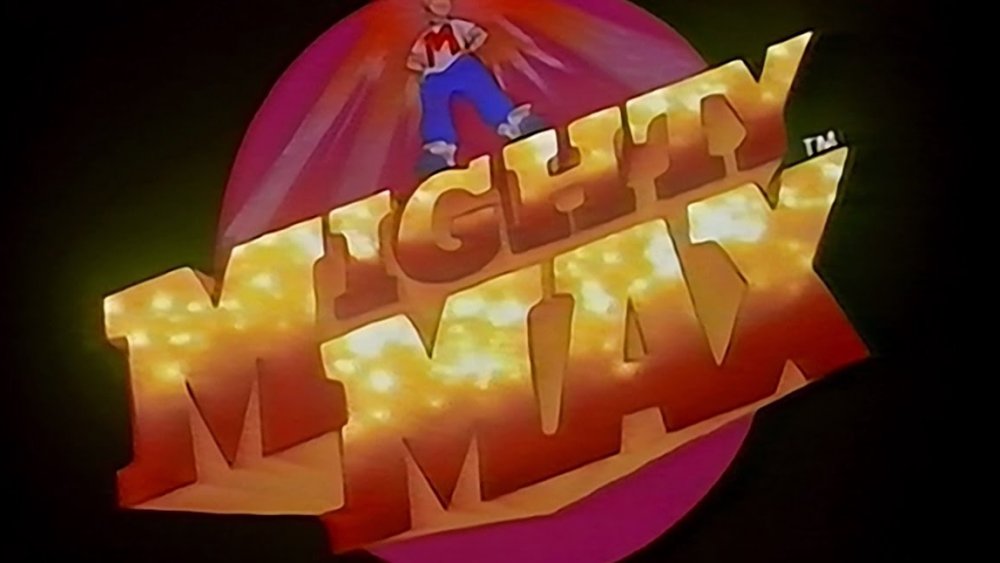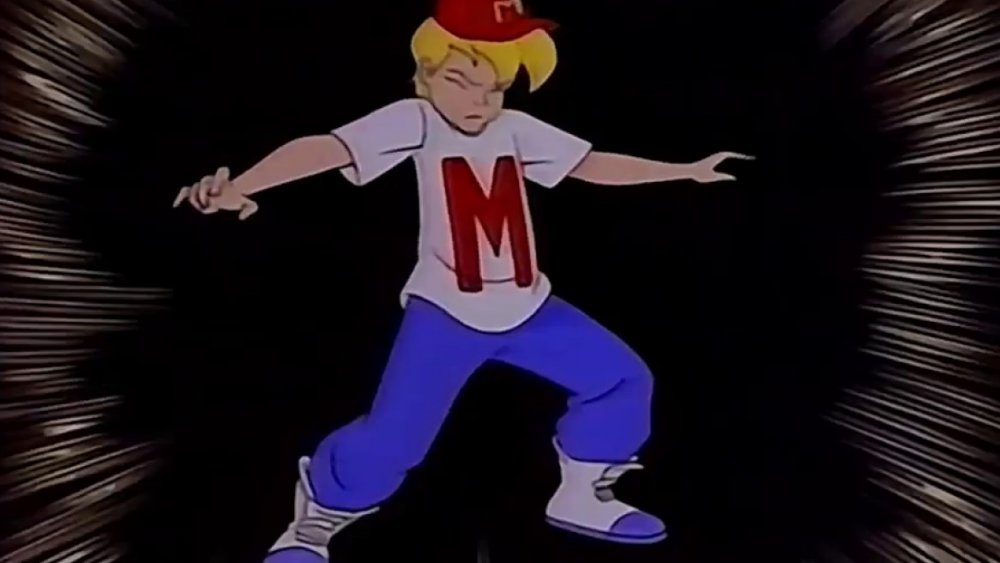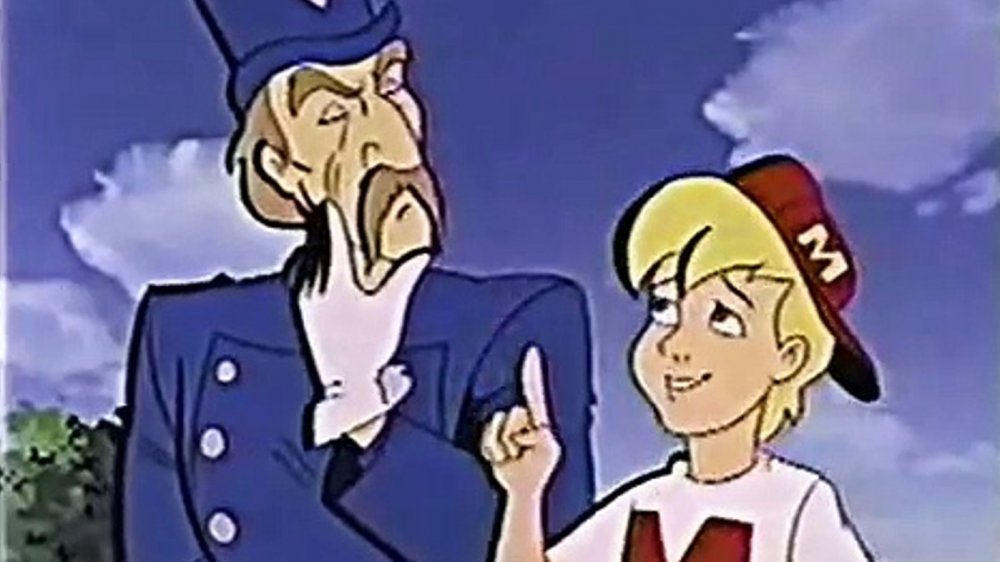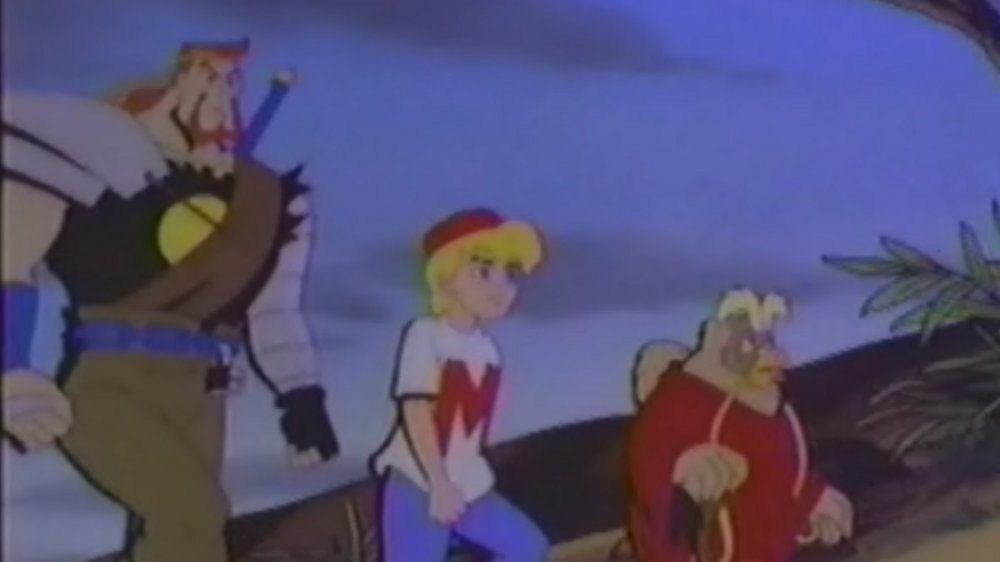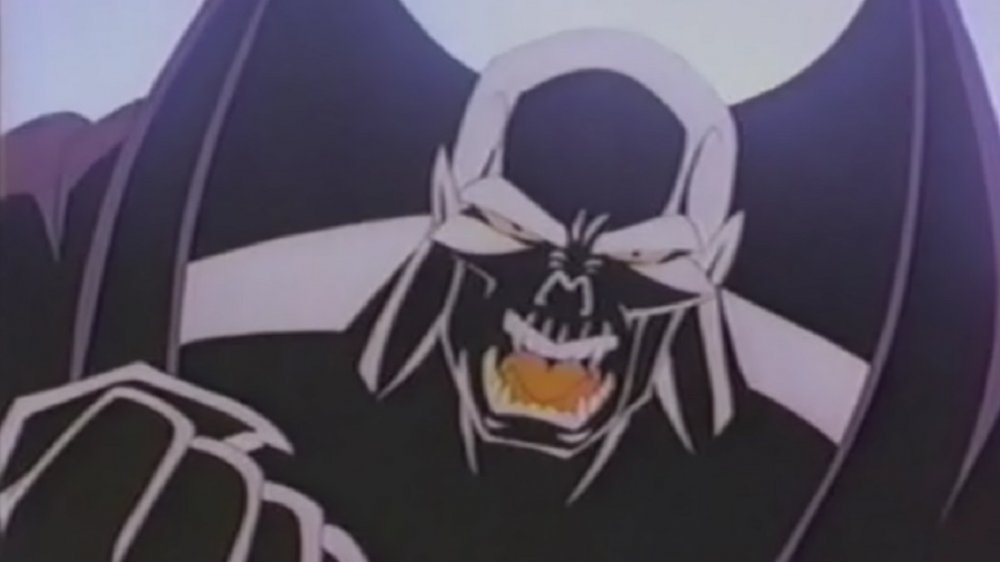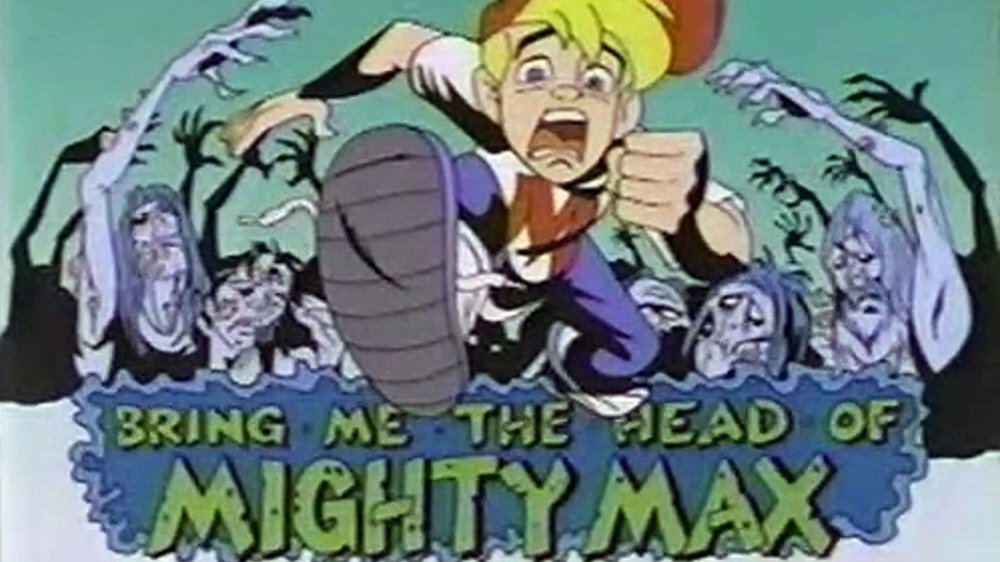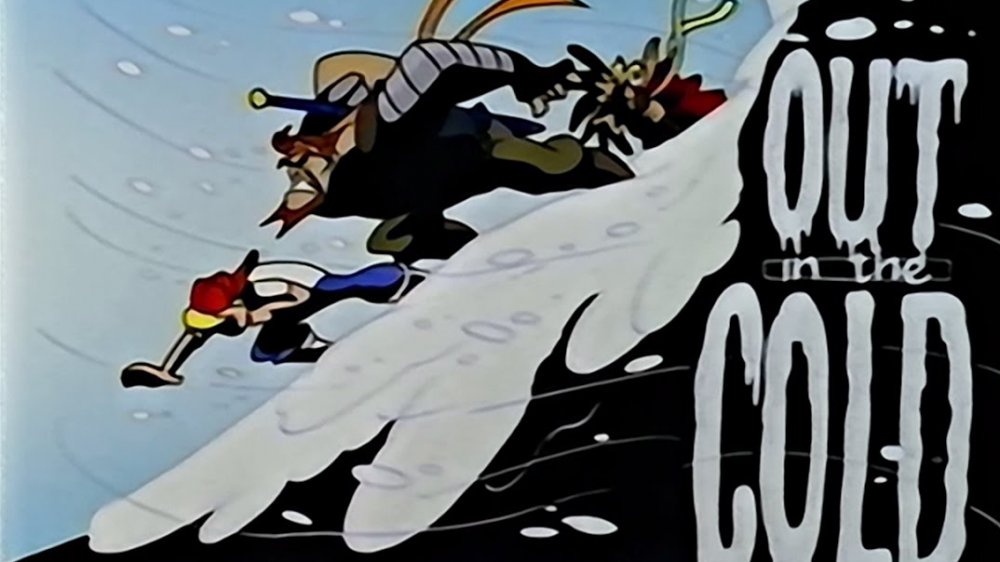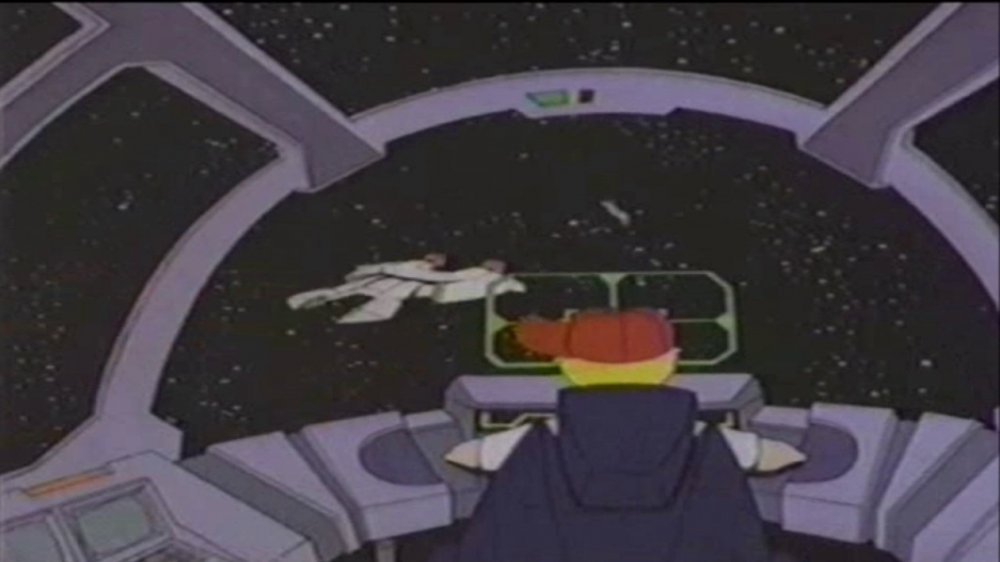The Untold Truth Of Mighty Max
Debuting in 1993, Mighty Max stood out against other cartoons of its time. Based on a toyline that was itself an offshoot of the popular Polly Pocket series, Mighty Max wasn't content to rest on its collectible appeal. Rather, this cartoon pushed itself to tell a genuinely thrilling story — and succeeded. Today, Mighty Max is remembered as "one of the best cartoons to be made entirely for the sake of selling toys."
How did such a daring, adventurous show grow from such money-grubbing roots? Simple: Production company Film Roman didn't skimp on talent. Mighty Max's cast includes the likes of Tim Curry, Tony Jay, and Frank Welker, while the crew was led by Mark Zaslove, fresh off creating Disney's TaleSpin, and Gordon Bressack, who would go on to win Emmy Awards for Pinky and the Brain and Animaniacs. What resulted is a cartoon of uncommonly sharp humor, fluid animation, and true-blue fun. Accompanied by Norman, an immortal Viking, and Virgil, an anthropomorphic fowl — which is, as he will remind you, not the same thing as a chicken — Max travels through time for 40 thrilling episodes.
Being Mighty Max
Max is the epitome of 1990s cool — just look at those high-tops he's sporting. A clever pre-teen with a one-liner for every situation, his life changes forever when he receives a magical cap in the mail. It is accompanied by a cryptic message: "You have been chosen to be the cap-bearer. Go to the mini-mart and wait for a sign, Mighty Max." There, he meets Virgil, an omniscient bird from the mythical land of Lemuria, and Norman, his bodyguard. His cap grants him the ability to travel through space and time, a power he must use to defeat the villainous Skullmaster, who is responsible for the destruction of Lemuria and Atlantis.
Max's story is unique in many ways — not too many destined heroes find their magical item in a mini-mart — but chief among them are his supporters. His mom, a daring archaeologist and hard-working single parent, is fully aware of Max's destiny as "the Mighty One." Moreover, she's not alone: Almost everyone close to Max knows about the powers and responsibilities of his cap, most prominently his two best friends, Bea and Felix. With the help of his friends, family, and immortal advisors, Max combines modern gumption, ancient intelligence, and magical powers to enormously exciting effect.
Polly Pocket's kid brother
The Mighty Max toyline was released in 1992 by British company Bluebird Toys. It's not hard to see why it was a hit: The series boasted killer box art, enticingly gruesome design sensibilities, and a built-in mythos. Like the Polly Pocket toys from which they spun off, Mighty Max toys were portable worlds in which kids could play out miniature dramas of daring escape, terrifying peril, and astonishing action. The toyline's success inspired plenty of imitators, including similar playsets for franchises like Star Wars and Batman Forever. Today, collectors carefully catalog the entire run of Mighty Max collectibles, from the ultra-popular Doom Zone line to a rare number of unreleased metallized playsets.
Interestingly, the toyline features a different backstory than the show. Plastic Max is younger, and was bequeathed the magical cap by his father. But this cap isn't the cap of the cartoon: It changes color, sends Max to a dimension known as the "Horror Zone," and doesn't come with a magical destiny involving immortal advisors, Skullmaster, or lost continents. These storytelling discrepancies were no obstacle to 1990s kids, apparently, if the toys' massive success is anything to go by.
A chorus of all-star voices
Mighty Max brought together a truly dazzling cast of voice actors. Rob Paulsen, the voice of Max, has named the show as one of his favorite little-known roles. This is truly saying something, as Paulsen's career includes some of the most celebrated cartoons of the 1990s: Paulsen played the title role in The Mask: Animated Series, Pinky from Pinky and the Brain, Raphael and Donatello in the 1987 and 2012 Teenage Mutant Ninja Turtles cartoons respectively, and Spike in the Land Before Time series.
Paulsen's not the only luminary in the Mighty Max cast, however. Tony Jay, the voice of Virgil, is also beloved for playing Judge Claude Frollo in The Hunchback of Notre Dame, Megabyte in ReBoot, and Mortanius in the Legacy of Kain video game series. Norman is voiced by Richard Moll, who found success as Two-Face on Batman: the Animated Series and as Aristotle "Bull" Shannon, the bailiff on Night Court. And then there's Skullmaster, Max's dogged enemy, voiced by the legendary Tim Curry. Curry has enthralled fans as Dr. Frank-N-Furter in The Rocky Horror Picture Show, Pennywise in the 1990 It miniseries, Nigel Thornberry in The Wild Thornberrys, and Palpatine in Star Wars: The Clone Wars — to say nothing of his celebrated career upon the stage. Add in supporting actors including Frank Welker, AKA Scooby Doo himself, and Rene Auberjonois of Star Trek: Deep Space Nine fame, and you've got a cast for the ages.
Darkest endings are the best
Mighty Max's finale, "Armageddon Outta Here," isn't what you might expect. In the final showdown with Skullmaster, Max ... fails. Norman and Virgil are both killed by Skullmaster, Skullmaster gains control of Max's cap, and the Crystal of Souls is reforged, granting Skullmaster complete dominion over time and space. Max averts total disaster by grabbing hold of the Crystal and absorbing its power, which he uses to send himself back in time, to the day he found the cap. Armed with knowledge and experience, he's ready to take a second shot at defeating Skullmaster. This is a notably dark ending for a series featuring a magic baseball cap — Max might live to fight another day, but you'd be hard-pressed to call it a victory, let alone a happy ending. He did, technically, save the world ... but he had to see his friends die to do it.
Rumors of a movie that would have given Max's story a more definitive ending have proliferated in the years since Mighty Max's end. A copyright was filed by Film Roman and Bohbot Entertainment for a Mighty Max motion picture in 1995, but no development has followed. Max's ending remains bittersweet.
Violence, monsters, and ghouls
Mighty Max comes shockingly close to being an outright horror series — albeit, one for kids. Even so, the show gets downright gruesome: Skullmaster's minions drink dragon's blood, murderous clowns transform kids into sideshow mutants, and ancient demons cut bloody paths across the landscape with massive, magical axes. Moreover, unlike later cartoons, which shied away from blunt descriptors of murder, Mighty Max's characters regularly use words like "kill" and "die." This is to say nothing of Max's enthusiasm for "babes," which speaks for itself. All in all, the show is a grab bag of controversial cartoon topics — a fact that might have led to its demise.
Mighty Max's cancellation remains a murky subject. Many fans theorize that its dark themes and use of horror imagery brought the hammer down, though others believe the show was always meant to have a short run. A comic series was produced, as well a 1995 video game entitled The Adventures of Mighty Max. But all in all, Max's story ends with the show's finale. Did its darkness do it in? A definitive answer is unlikely to arrive anytime soon, but as far as fans are concerned, it's the likeliest explanation available.
Educational globetrotting
Each episode of Mighty Max is concluded with a short ending scene, in which Max delivers an educational epilogue about the episode's events. As he, Virgil, and Norman have the power to explore all of human history, the facts he dispenses are wide-ranging and genuinely interesting. From his bedroom desk, the local library, and the museum his mother works for, Max discusses everything from early European assumptions about Native Americans to the biology of the giant squid. Unlike G.I. Joe's infamous PSA shorts, these endings aren't about moral lessons so much as they're about the wide, wild world we live in.
These epilogues don't just recount facts, however — they frequently examine world mythology. Norman, fans learn, is the origin point for stories of Lancelot, Hercules, Samson, Thor, and Little John. After Beowulf features in one episode as a washed-up professional wrestler, kids learn a little bit more about the big guy's actual story. It's not just educational, but genuinely entertaining.
The end?
Mighty Max tells a truly epic story of magic, conquest, and world history. Sadly, it never saw the long-ranging success other 1990s cartoon franchises enjoyed: Though its toys were hugely successful, they're pretty much only remembered by committed collectors. The Adventures of Mighty Max, a tie-in SNES game, is almost universally hated, proving there is at least one universe in which Max is far from mighty. The 10-issue comic series, published by the defunct Game Players Comics, was never published outside the United Kingdom, and has never been reprinted.
Several episodes of the show were released on VHS, but there has yet to be an official release of the entire show. Glimmers of hope have emerged in recent years: The Polly Pocket toyline returned in 2018, and Mattel renewed the Mighty Max trademark in 2015. Is a reboot in the making? No one can say for sure, but it seems far from impossible. For now, however, fans must content themselves with rewatching the 1993 cartoon.
